Grime and Punishment
Tenants' Rites: For families in the Santee neighborhood, dilapidated buildings, poor living conditions and a shortage of places to play are a fact of life.
In one of San Jose's poorest neighborhoods, city officials are prosecuting the absentee property owners who collect rent and defy the city's codes. For the residents of Santee, it's a beautiful day in the neighborhood
By Michael Learmonth
ON A SUNDAY IN APRIL, when the spring rains were raging like a lion, Timothy Luong learned what it felt like to lose his freedom. The 41-year-old computer engineer left his home in Milpitas and turned himself in to authorities at the Elmwood Correctional Facility, where he was photographed and fingerprinted. He surrendered his personal belongings and was locked in a room with other inmates, where he spent the day unable to sit or lie down.
Acting on orders from Superior Court Judge William Martin, Luong was beginning his 15-day sentence, to be served on consecutive Sundays straight through the summer. Over the weeks that followed he turned himself in each Sunday, donned an orange vest, boarded a Department of Corrections bus and was delivered to Overfelt Gardens Park to pick up trash with drunk drivers, check-bouncers and traffic scofflaws.
"The work was hard because I am an office-type person," Luong says, recalling the long outdoor hours collecting society's detritus. "The officers were yelling all the time. I didn't want to get involved in the legal stuff. I was scared."
Salvador Farias, 39, a businessman who normally runs a janitorial services company, knows what Luong means. He, too, got convicted and assigned to manual labor in the Weekend Work Program. One weekend he spent sweeping a parking garage at San Jose State University. The next weekend he spent emptying trash containers in Lake Cunningham Park.
It was a downright humbling experience for this pair, serving jail time like hundreds of other small-time Silicon Valley criminals by doing grunt work on weekends. And it was a change from their regular routine of depositing rent checks, scoping out real estate prices and advertising their properties in a plush market. Luong and Farias are victims of a new kind of crackdown in San Jose, one aimed at landlords in the troubled Santee neighborhood who continually flout minimum building-code requirements. The criminals in these cases can't blame economic conditions for their plight: They are among those who have benefited most from Silicon Valley's real estate boom.
In Santee more than a dozen landlords like Farias and Luong are getting stiff sentences for the deplorable conditions found by city inspectors in their buildings. After months and sometimes years of the landlords' refusing to bring their buildings up to minimum code standards and to comply with a court order designed to fight crime and blight, the city of San Jose is throwing the book at them.
"You'd think they would get the message that the city is serious," says Art Niño, community coordinator for Project Crackdown. Niño runs a small office in Santee that houses two building code inspectors and a cop, who work full-time trying to keep the 96 tightly clustered fourplexes in Santee from infestation by rodents, roaches or drug dealers, or from simply falling down from neglect.
"It's not like we're asking them to put in big-screen TVs," says San Jose cop Micki Hippeli, who sometimes assists city inspectors. "We're asking them to keep out the rodents, fix the walls, clean up raw sewage and make this place habitable."
Santee Clause
THE SANTEE NEIGHBORHOOD is situated along the west side of 101 just south of 280. Only two main roads lead in or out of the seven-block cluster of 92 nearly identical fourplexes, boxy structures built in the 1960s very close together with walkways in between and private alleys with carports in the back. Traditionally, the fourplexes have been owned by absentee landlords who keep them as investment properties.
By the 1980s, the Santee neighborhood was mostly ethnic and poor. A survey of residents conducted in 1990 found the population was 53 percent Hispanic, 25 percent Asian, 12 percent white and 1 percent Native American. The closely situated dwellings became a haven for gang activity and the drug trade. Customers came from all over the Bay Area to patronize the drive-through drug market that the private alleys had become.
In 1989, the city established an area containing Santee as a Project Crackdown area. A few years later an office was set up next to Santee Elementary School as a neighborhood action center where Santee residents could report problems and the city could more quickly direct services such as police and building inspectors to the area.
But by the mid-'90s, as San Jose police continued to find gang strongholds in the neighborhood and the buildings continued to deteriorate, it became apparent that Crackdown wasn't enough. The city offered the landlords more than $1 million in federal dollars to fix up the decrepit private alleys if they would agree to hire court-approved private security and property management.
But some landlords refused to cooperate with the conditions, and soon the city realized the million-dollar carrot wasn't enough. In 1995 the city decided to take a different approach, filing the largest public nuisance lawsuit in city history.
That year the city sued 134 landlords individually, demanding, among other things, that they hire security guards and professional property management, remove graffiti within 48 hours, screen tenants and limit the number of people living in the apartments.
The result of a settlement agreement last year between the city and the landlords was a permanent injunction that brought legal teeth into the equation. Instead of relying on the goodwill of landlords to cooperate, the courts would now compel them to do so.
But the legal teeth have meant little to some of the landlords in the neighborhood who continue to refuse to comply with the injunction. Since the beginning of 1998, Senior Deputy City Attorney Carol Overton has filed more than 100 contempt-of-court charges that have led to jail sentences for more than a dozen landlords. Only time will tell if living in a jail cell, with the county as landlord, will be enough to get landlords to abandon their old ways.
"Everyone's taking advantage of the tenants," Niño says. "It's the way they do business out here."
In their legal fight to clean up Santee, the city attorney and Judge Martin are sending the message that the sentences are only going to get longer and harsher.
"I think the court has lost its patience," City Attorney Joan Gallo surmises. "Property owners who have been sent to jail can serve as a real warning that the city is serious and the court is serious. We haven't won the battle of Santee yet, but we will. We are going to turn that neighborhood around."
Nun Given: Sister Miriam Fahey started turning in drug dealers by phoning in license-plate numbers to police. Santee landlords have since raised her rent higher than the law allows and had her car towed twice.
Holy Warfare
SISTER MIRIAM FAHEY, 71, lives in a fourplex on Tami Lee Drive in Santee. There, she and three other nuns run a small library and literacy program. Contrasting with the packed dirt or cement covering other back lots, Sister Miriam's contains a well-tended garden of flowers and vegetables.
When she moved into Santee two years ago, she began to take note of the goings-on in her back alley.
"The dealing started as early as 6:30 in the morning," she says. "Of course, I don't stay up at night, but I'm sure it's going on at night as well."
She began to record license-plate numbers--pages of them--and handed them over to the San Jose Police Department. Soon, plainclothes members of the narcotics team were constant fixtures in the alley, and the drug deals became less frequent.
This year, Sister Miriam became president of the Santee tenants association, where she has exerted all the energy she can muster to get the landlords in her neighborhood to get professional property management and security so that the federal block grant can be used to improve the back alley behind her row of fourplexes.
Her gentle arm-twisting has put her at odds with the president of the homeowners association and Santee landlord leader, Stephen Vogel. Vogel owns three fourplexes in Santee, including the property right next to Sister Miriam's. So close is his property that he actually laid claim to one of the sisters' parking places and had the nuns' cars towed when they parked there. Twice.
The first time, the nuns had to pay to get their car back. The second time, SJPD Officer Micki Hippeli convinced the towing company to give the sisters a break.
Vogel readily confessed to having the nuns' cars towed, explaining that he needs a parking spot for the once-a-month meetings he chairs as president of the homeowners association. When asked to talk about issues regarding Santee, Vogel said, "I have absolutely no comment."
But Vogel did make his feelings known when he encountered Sister Miriam in her front yard and gave her a warning. Sister Miriam recalls him saying, "You know, Sister, we don't need people like you coming in and telling us what to do."
"Imagine him saying something like that to an old lady," she says.
But Vogel is suffering more than Sister Miriam's disapproval. And the legal trouble he's in now is a major reason he's not talking to the press.
The city has charged him with 52 counts of contempt of court for conditions in his buildings, more than any other landlord to date. The city contends that he has failed to provide court-approved property management and security and has allowed deplorable conditions to exist in the apartments themselves.
City code inspectors found leaded paint peeling from the walls in apartments where there were small children. In April, they found a hole in a dining-room ceiling several feet wide. They found water damage, leaky bathrooms, deteriorated floors and clogged sinks.
Amanda Wilson, an attorney for the Public Interest Law Foundation, represents some of Vogel's tenants. She says that when Vogel was notified of the peeling paint, he accused the woman who lives there of peeling the paint off herself. The hole in the ceiling of 1424 Tami Lee gaped all winter. A photograph of the damage shows the mother-and-daughter tenants sitting beneath plaster hanging in sheets from the ceiling above their dining-room table.
If even a few of the 39 charges hold up, Vogel could be joining the sheriff's summer camp for an unprecedented length of time for someone convicted of being, essentially, a slumlord.
Vogel is a professional landlord who has owned three buildings in Santee for years and knows, as well as anyone, how to flirt with the limits of code inspectors. Other Santee landlords, such as Po and Carmen Wong, run up against language and cultural barriers that may keep them from understanding the court injunction, or at least understanding the consequences of ignoring it.
The Wongs are the landlords at 1368 Dubert Lane and the owners of Jumbo Seafood Restaurant on Fourth Street at San Fernando in San Jose. When they stood before Judge Martin, they had to have a Cantonese interpreter. Admitted into evidence was a photograph of a ceiling in their building that had been repaired with a JCPenney bag. For the Wongs' 25 contempt charges--far fewer than Vogel's--they were sentenced to 24 days each in the Weekend Work Program and a $2,040 fine.
Lessor Truths
STEPHEN VOGEL is represented by attorney Dennis Lempert, who promotes his practice with a full-page three-color ad in the Yellow Pages. The ad says that he is a former deputy DA who specializes in criminal defense and that he also takes most major credit and ATM cards. Lempert says the city is carrying out a "vendetta" against his client because they disapproved of his participation on a committee the city assembled to draft the Santee Neighborhood Revitalization Plan. Lempert says only a few of the city's charges have merit, and those problems were corrected long ago.
"The city administration took umbrage at his activities and have singled him out particularly," Lempert says.
"This is simply not true," Gallo says. "We will fully and aggressively enforce against any property owner who doesn't fully live up to the injunction that was signed. We are not singling out examples."
Adding to the weight of Vogel's alleged maintenance lapses is the fact that Vogel receives a federal subsidy each month from HUD to make improvements to his buildings and to make rental units available to low-income tenants.
Vogel owns several of the 250 housing units in Santa Clara County covered by a subsidy known as the Moderate Income Rehabilitation Program. Through the Mod Rehab program, landlords can set rents slightly higher than the HUD-determined market rate. Tenants that move in pay 30 percent of their income on rent, and HUD covers the rest. In return, landlords agree in writing to make repairs in a timely manner and assure that the units are maintained in a safe, decent and sanitary condition.
"Most landlords abide by the agreement," says Housing Authority deputy director Candy Capogrossi. "But just like in the open market, you have some recalcitrant landlords. If someone is committing fraud, they will go to court and may be prosecuted."
Capogrossi says the units are inspected annually, and she can recall no recipient being convicted of fraud.
Citing privacy issues, Capogrossi won't release any information about who is enrolled in this program or how much money they are receiving from the feds.
Some of Vogel's tenants, however, were willing to talk about it.
One tenant pays $604 for her two-bedroom, and HUD kicks in $316 a month to cover the $920 total rent for the unit.
Another tenant in the same building pays $410, and HUD pays $487 for an $897 apartment.
A third tenant in a different building couldn't find her paperwork but says she pays $350 a month and that the subsidy on her unit is about $800.
Amanda Wilson believes that Vogel's full subsidy on the three buildings he owns in Santee could amount to nearly $100,000 a year.
Vogel, through his attorney, declined to provide the amount of his subsidy as well as documents showing expenditures to improve the property.
In facing the contempt charges, Vogel and Lempert have asked that Judge Martin be removed from the case because they believe he is biased against the Santee landlords.
For many landlords charged with contempt of court, facing Judge William Martin is their first experience with the criminal justice system. For landlords who are also businessmen, high-tech executives and doctors, the experience of having some of their freedom taken away can be quite foreign.
No Holds Barred: Neighborhood kids play on the sidewalk in front of a patch of lawn protected by iron fencing and padlocked by a Santee property owner.
Slumlords in the Slammer
JUDGE MARTIN SITS on the bench in Department 15 of Santa Clara County Superior Court. In this court, use of the word "slumlord" is strongly discouraged, as are landlord pleadings that their "property rights" are being violated. On a recent Friday, two landlords came before Martin to ask that their sentences be reduced, two others to settle their cases before they go to trial.
Greg Anderson, a Monte Sereno resident, Santee landlord and self-described businessman, was sentenced to 20 days in jail which he had the option of serving out in the Weekend Work Program. He came before Martin on this day to explain that it was impossible for him to conveniently serve the time because of his out-of-town business obligations.
Anderson was charged with 11 contempt charges for a hole in the ceiling of one unit located at 1425 Dubert, water damage, an overflowing garbage bin and incessant drug-dealing from the building. One inhabitant, a self-described member of "Tami Lee Gangsters," lived in the building but was not named in any of Anderson's tenant records. According to the city, police met with Anderson to discuss the presence of known drug dealers on his property. The city alleges that Anderson did nothing to stop it.
In court, Judge Martin lays out Anderson's options: "Would you rather do weekends or straight time?"
Anderson, who appeared in court in a tieless white shirt and slacks, explained that community service would be much more convenient than jail, given his travel schedule.
Martin just shook his head.
"What's stopped people from coming in to see me is giving time," Martin says, explaining that the fines and community service doled out in the past didn't seem to work. "Some people are paying the fines as a cost of doing business."
The attorney for the city in this matter is the person who, to the landlords, most represents the "stick" of the city's enforcement effort. Senior Deputy City Attorney Carol Overton hardly looks the part. She is young and petite, resembling Holly Hunter in a wool suit. On occasion, she visits Santee to talk to tenants, often in Spanish, about any problems they might be having with their landlords.
It is she who stands opposite Greg Anderson today and reminds the judge of the stronger points of the city's case.
In Anderson's first contempt hearing, she says, he had told the judge it had been "inconvenient" to maintain his property given the amount of time he spent out of town. She also reminds Martin that Anderson had been unable to provide police with a written record of tenants in his property when there was drug dealing going on there.
"I know we don't have any tenants in the audience today," she says. "They're not here to explain what it was like to live in the apartments Mr. Anderson was too busy to maintain."
On this matter, Judge Martin needs little convincing.
"It's gotta be some jail," Martin says matter-of-factly. He gives Anderson a Nov. 30 booking date. "I understand it's a major inconvenience, but it's designed to deter."
The final judgement is made. Anderson looks downcast, then grabs his laptop and heads for the door.
Martin, who is gaining some notoriety for stiff sentencing, showed similar contempt for the pleadings of Santee landlord Gilbert Marosi, who was hauled into court for a sewage spill on his property. Marosi, who believes he is the target of a conspiracy between the Department of Code Enforcement, San Jose police and the city attorney, was sentenced to 100 hours of community service and a $4,000 fine--$1,000 for tenants in each unit--for a sewage leak that sat on his property for a week.
Marosi disputed the code inspector's claim and said the spill was cleaned up as he returned from vacation and became aware of it.
"The only thing I admit is I was out of town and something happened," he says.
Christopher Gardner
Conviction Notice
MAROSI IS A PROFESSIONAL landlord who owns more than a dozen rental properties around San Jose. When he realized he was going to be sentenced for the spill, he says he wanted to make the best out of a bad situation and told the judge he was happy to do some community work, that he "gets by" in nine languages and has a master's degree.
"I said I would be happy to help out with something that correlates with my background," he says.
The judge took Marosi's qualifications into consideration and assigned him to serve his time in manual labor, picking up cigarette butts and cleaning public bathrooms.
"It's vicious," Marosi says. "The city is out of control. If you're a landlord in the Santee area, you're a dead duck."
Marosi claims he cleaned up the sewage spill and accuses city inspector Diane Buchanan of lying.
"My conscience is clear," he says. "Why would I leave raw sewage there? For what possible purpose?"
Marosi blames bad tenants for some of the problems he is saddled with. The sewage spill, for example, Marosi claims was caused by tenants "abusing the plumbing system." And Marosi says that "like a nice guy," he paid to have the drains unclogged. He gets enraged just talking about having to serve time for the sewage that sat on his property.
"A cat will cover his shit," he rants. "A dog will cover his shit. You mean to tell me that tenants there will not cover their shit?"
The day of his sentence, Marosi called his tenants and offered them $50 to $100 of the $1,000 the judge had ordered him to pay each of them. He also admitted he has been charging his tenants for water, another violation of the injunction.
"I had been charging for water," he says. "Anything over $40, they pay. That is to keep them from letting the toilets run."
Another landlord, Frank Lindsen of Sacramento, agrees the tenants are a big part of the problem. He says he bought his building, 1376 Dubert Lane, a decade ago and borrowed $30,000 to fix it up. He says he spent $2,000 alone on landscaping and a sprinkler system with timers that was quickly destroyed by the tenants.
Soon after, he says, he came by the building and found a pit dug in the yard for roasting a pig. Kids had ripped out the wires to the sprinkler system, and the sprinkler heads were crushed by people driving on the lawn.
"The way they paint me, I'm an absolute slumlord. It's not right," Lindsen argued.
Past Due
BUT THE LANDLORDS who wind up in front of Judge Martin are a distinct minority. There are many others who take their obligations as a landlord seriously, rather than just showing up on the first of the month for the check.
One of the first landlords to endorse the settlement with the city and comply with its terms was Joel Carter, a San Francisco resident who owns four properties in Santee. Carter says that professional management and security are expensive, but the results make it worthwhile.
"From a financial standpoint, it has been tough," Carter says. "But I think there has been definite improvement. I would like to see everyone in the neighborhood act responsibly and have professional property management."
As for the future of Santee, Carter thinks the money he invests now is a good investment. "Ultimately, the neighborhood is nicely situated--easy access to freeways and schools," he says. "The properties have been undervalued, and there has been some appreciation in the neighborhood."
Looking at the falling-down fences, packed dirt and potholes behind her apartment, Sister Miriam says she'd like to see the alleys improved so children can "run, skate and play tag or 'one foot off the gutter.' "
When Sister Miriam's landlord, Jorge Palacios, raised her rent earlier this year, she called Art Niño, who told her, sure enough, the $100 increase violated the city's rent-control law. For buildings like those in Santee, which are covered by the law, landlords can only raise the rent 8 percent per year. For Sister Miriam that would be $64.
If her rent continues to rise, she says, she and the other sisters will have to abandon their garden and the library and find another place to live.
Landlords are becoming more creative in prying out every possible penny from their tenants. One tenant, who asked not to be identified, said her landlord doubled her deposit from $400 to $800 out of the blue.
"I tell you, these owners are so greedy," Sister Miriam says. "I pray every day that they would have some compassion."
Jorge Palacios did not answer several phone calls. Sister Miriam believes the rent increase was an honest mistake. But then, the Sister assumes the best in people.
If it's enlightened self-interest that gets landlords to behave responsibly, Sister Miriam says she'll take it. While appealing to conscience works well with children, she thinks many adults who own the buildings in Santee need to see the inside of a courtroom, or a jail cell, to be motivated to do the right thing.
Jorge, Christopher and Ricky, little boys who live nearby, have stopped by Sister's Miriam's garden for a lesson she promised on growing flowers and vegetables. As she helps them push cuttings of her ivy geraniums into little dirt-filled plastic pots, she says, "They don't ever pick my flowers after we do this."
She watches the children walking down the alley with their potted plants and says proudly, "One small step for humanity."
[ San Jose | Metroactive Central | Archives ]
Copyright © Metro Publishing Inc. Maintained by Boulevards New Media.
![]()
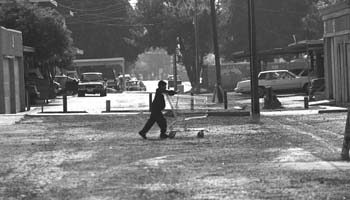
Christopher Gardner

Hitting the Ceiling: Now that the city has lost patience with Santee landlords, violations such as the water-damaged room above may put some property owners in jail.
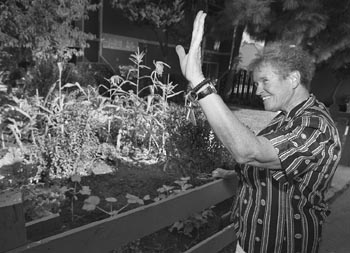
Christopher Gardner
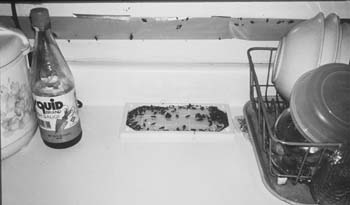
Bugged: Unwelcome six-legged tenants are among the problems faced by some renters in the Santee area.
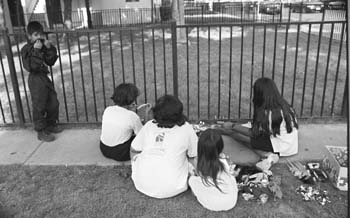
Christopher Gardner
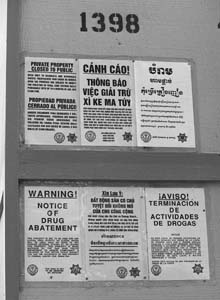 Tenants, Anyone? An apartment door tells the story of Santee's decade-long war on drugs and gangs.
Tenants, Anyone? An apartment door tells the story of Santee's decade-long war on drugs and gangs.
From the October 8-14, 1998 issue of Metro.
![[Metroactive News&Issues]](/gifs/news468.gif)